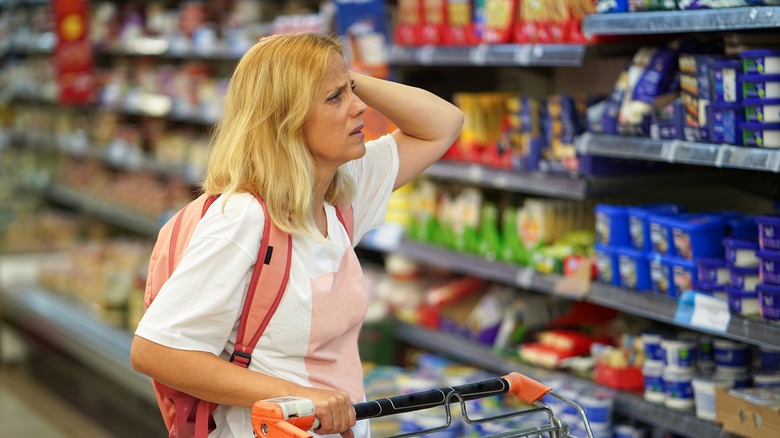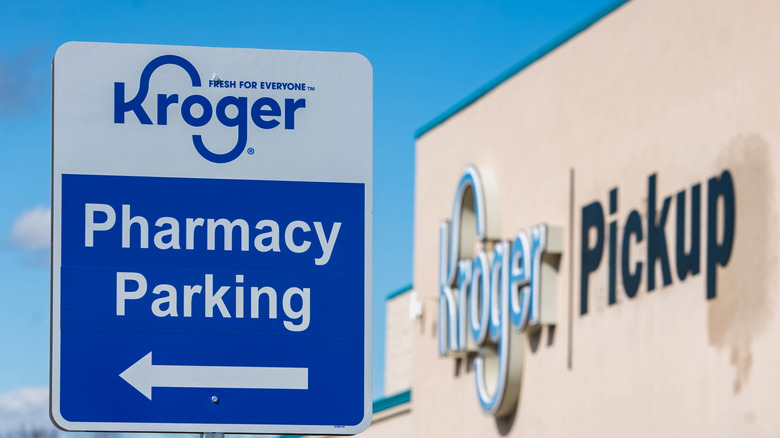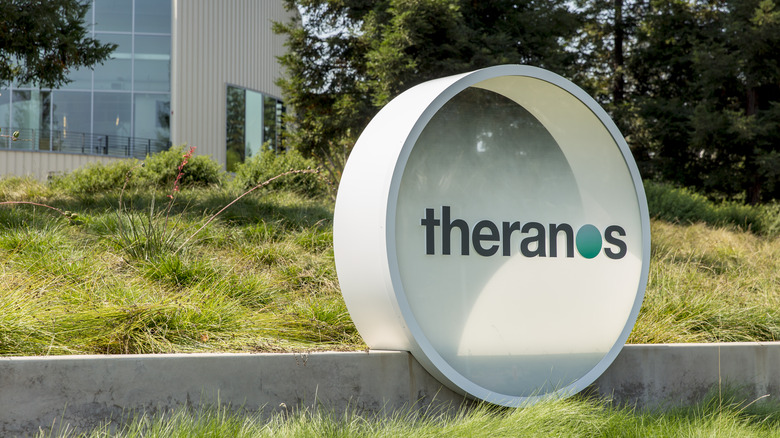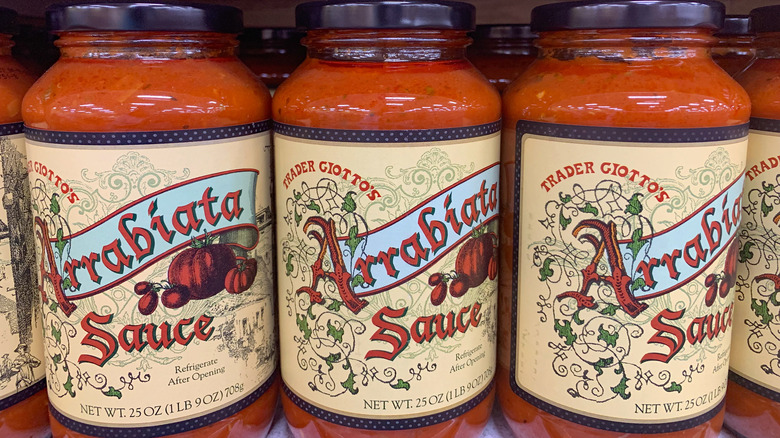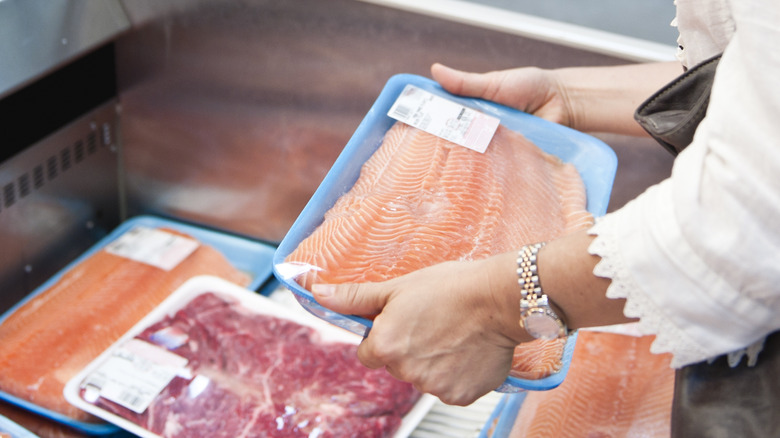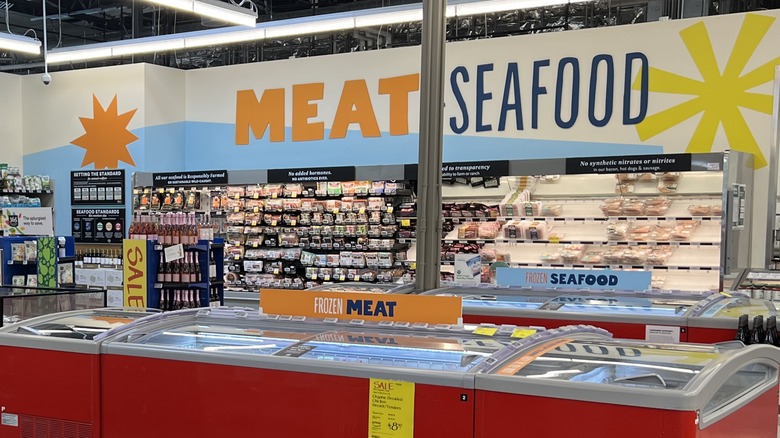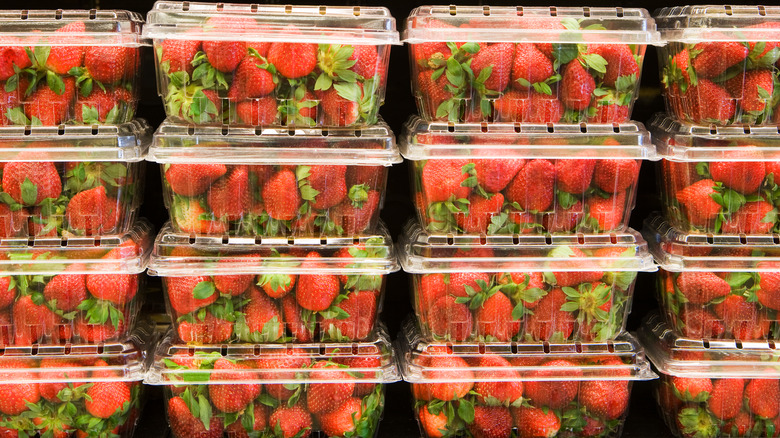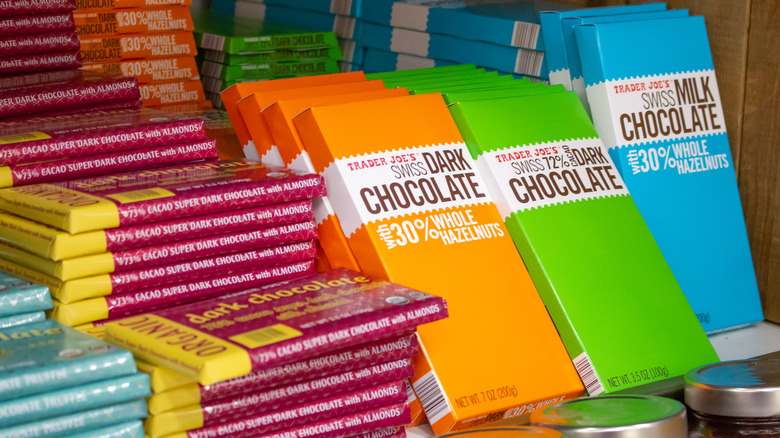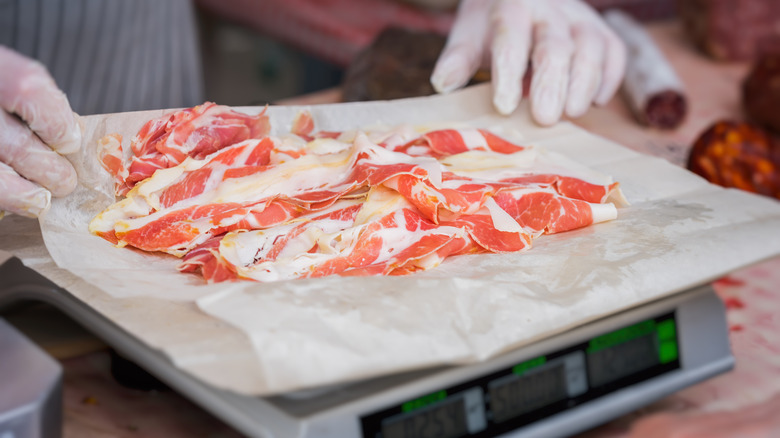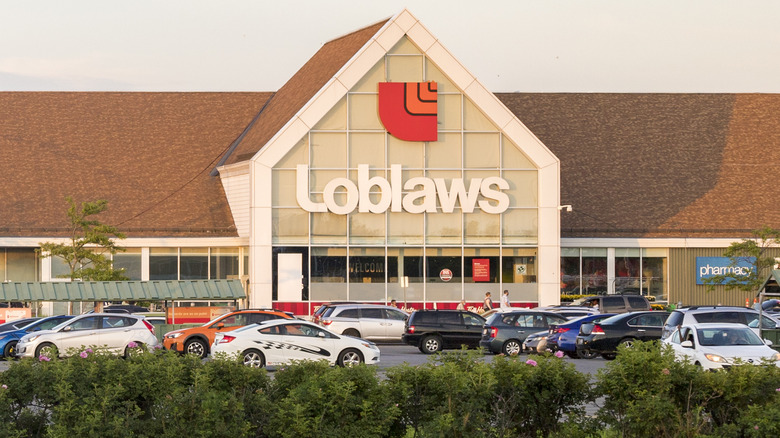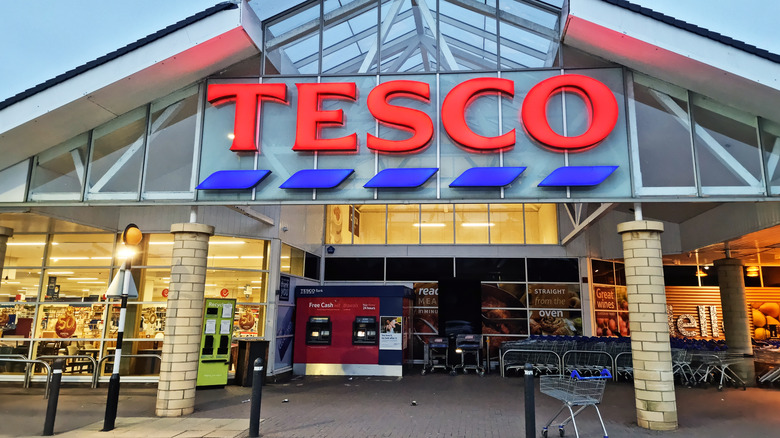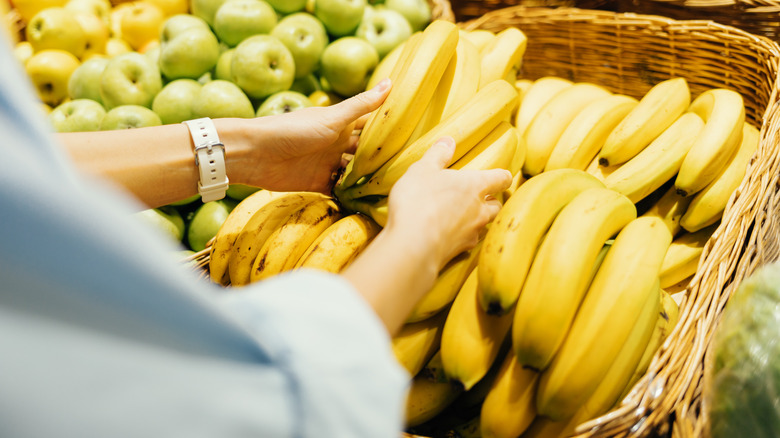Scandals That Shook The Biggest Grocery Stores
While some of us do grow our own food, the majority of people must rely, at least in part, on grocery stores and supermarkets. Although the COVID-19 pandemic dramatically changed how consumers do their shopping by shifting record amounts of grocery shopping online, people still make use of their local stores. According to Drive Research, at present there are over 63,000 grocery stores and supermarkets doing business in the United States. The average American heads to the store for groceries eight times in a single month where they spend a little over $150 during each trip.
When something goes wrong at the supermarket, it can have devastating effects on customers. Trust is broken, and faith in both food safety and personal safety can be shattered. Some problems, such as tone-deaf branding or food contamination, are quickly remedied, while others, like a data breach, result in consequences that affect consumers and the stores themselves for years afterward.
Here are 13 serious scandals that grocery stores and their customers will not forget any time soon.
Kroger customers personal info was compromised in data breach
For the convenience of their customers, many large grocery chains include a pharmacy. Kroger is one supermarket that goes the extra mile by also offering an in-store walk-in clinic at select locations. The idea behind The Little Clinic, which The Kroger Co. acquired in 2010, was to make healthcare more accessible by offering extended hours and being placed in locations people are already going to on a regular basis, like a grocery store.
Unfortunately, both pharmacies and medical offices retain a lot of private patient information that could easily be put to nefarious use, something that approximately 3.82 million Kroger pharmacy and The Little Clinic patients discovered on February 19 2021. In December 2020 and January 2021, hackers gained access to patients' names, email addresses, home addresses, phone numbers, birth dates, insurance information, medical information, and social security numbers.
By July of that same year, Kroger had agreed to pay $5 million in a class action settlement. Kroger also agreed to provide credit monitoring free of charge to those affected as well as strengthen its patient information protection practices. We're really hoping that a lesson was learned here and Kroger followed through.
Safeway partnered with Theranos
Safeway is another large supermarket chain that offers medical care to its customers. So, when the Theranos corporation announced that it had invented the technology for performing rapid blood tests using compact devices, the chain took notice. In 2012, Safeway invested over $10 million in the company and spent $350 million building clinics for the devices in around 800 of its locations.
Naturally, when Theranos and its medical devices failed to deliver the promised results, missing deadline after deadline, the partnership ended in 2015. Safeway's former CEO Steven Burd, who retired in 2013, testified about the bad deal at the trial of Theranos founder Elizabeth Holmes in 2021.
The clinics that were built turned out not to be a total waste and were put to use doling out flu shots and other vaccinations to customers. Getting into such a deep and costly partnership with one of the largest medical scams of the early 21st century, however, is not a good look. The public, as well as Safeway executives, are not likely to forget this major gaffe anytime soon.
Trader Joe's uses racist branding
In the summer of 2020, a petition called into question Trader Joe's practice of branding many Asian, Latin American, Middle Eastern, and southern European–themed products under different, albeit often equivalent, names. These names include Trader Ming, Trader Joe San, Trader José, Arabian Joe, and Trader Giotto.
A spokesperson for Trader Joe's, Kenya Friend-Daniel, told NPR, "We made the decision several years ago to use only the Trader Joe's name on our products moving forward," adding that these changes were in place before the creation of the petition and not in response to it. She also admitted that while the original intention behind the branding was probably "lighthearted ... we recognize that it may now have the opposite effect — one that is contrary to the welcoming, rewarding customer experience we strive to create every day."
However, per The New York Times, a company statement made a few days after Friend-Daniel's said, "We thought then — and still do — that this naming of products could be fun and show appreciation for other cultures." As of 2023, branding like Trader Ming's can still be found on Trader Joe's shelves.
Kroger underpays employees
A Kroger Co. internal document entitled "The State of the Associate" and marked confidential lays bare just how underpaid Kroger employees across the country were as of 2017. Per the document, the majority of employees "are considered to be living in poverty and need State Aid ... just to get by."
When the document was leaked in January of 2022, the reaction was not great, to say the least. That same month, nearly 9,000 employees of Colorado's King Soopers, a chain of grocery stores that is owned by Kroger, went on strike for, among other things, better wages. Kroger offered them a starting wage of only 13 cents above Denver's minimum wage, where the cost of living is 16% higher than the national average (via AreaVibes).
In the fall of 2022, Kroger barely managed to avoid another employee strike in Ohio. Under the new contract, the majority of union employees were given a $1 per hour raise. Only a few months later, in January 2023, a class action lawsuit was filed against the company by workers who claimed wage theft. The employees' attorney, Rachel Nadas, told Insider, "These are workers who are not in a position to have their paychecks reduced." This is not a great track record for one of the largest grocery chains in the U.S.
Worms were found in Kirkland brand fish
Supermarkets experience product recalls on an increasingly common basis. Sometimes it's due to e. coli or salmonella contamination. Other times unsafe objects such as broken glass have been found mixed in with the food. But, finding worms inside Kirkland brand filets of halibut is definitely memorable (and scarring).
In 2022, Dr. Vahid Berdjis, his wife, and two children sued Costco Wholesale Corp. asking for $200,000 in damages. Roughly one year prior, the family had purchased a package of Kirkland Fresh Wild Pacific Halibut Fillet from a Costco store in San Dimas, California. After cooking and consuming some of the fish, the family was shocked to see live worms wriggle out of the filet.
To no one's surprise, the two children swore off seafood from that moment on, which might be a good idea considering finding parasitic worms in fresh seafood is not uncommon. If the fish is cooked thoroughly, the worms pose no danger when eaten. The family charged that Costco failed to adequately educate staff and customers about the possible presence of parasites.
Whole Foods lied about antibiotic-free beef
Whole Foods was founded as a health food store that promoted what its founders believed was a healthier way of eating. Only foods that it deems to be "natural" are permitted on its shelves. This includes "no antibiotics, ever" in the meat that it sells. Customers were happy to pay more for what they believed, and what the store promised them, was a healthier product.
More than a few jaws dropped in late August 2022 when Whole Foods' "no antibiotics in its meat" claim was proven to be false, resulting in a lawsuit alleging fraud. Nonprofit Farm Forward performed independent tests on beef purchased from Whole Foods. It found trace amounts of growth antibiotic monensin sodium and antiparasitic fenbendazole.
Perhaps this is less surprising when you learn that there is no federal testing to verify claims that cattle were raised without being given antibiotics. This means that consumers have little choice but to trust the labels and promises of retailers. In this case, Whole Foods broke the trust of a lot of its customers. It's a cautionary tale that many are likely to heed.
Kroger was sued for lead contamination
California's Safe Drinking Water and Toxic Enforcement Act of 1986, better known as Prop 65, was designed to protect sources of drinking water from chemical contamination that might result in increased risks of cancer, birth defects, or forms of reproductive toxicity. Businesses are required to inform the public if their products may contain such chemicals.
This has resulted in some amusing situations, such as the Prop 65 warning sign posted outside of Disneyland. But, it has also been used many times to protect public health, such as in 2022 when Kroger was sued by for-profit environmental activist group Ecological Alliance LLC. The group tested 25 Kroger brand items purchased from a Kroger-owned grocery store located in Southern California. Of those, 15 tested positive for an unhealthy amount of lead.
These products included organic diced peaches and pears, with 11.7 micrograms of lead per serving (the legal limit is 0.5 micrograms per serving), and a spinach salad kit with 70.1 micrograms per serving. Also named were frozen vegetables, fresh fruit, and breakfast cereals.
Trader Joe's was sued for high levels of lead and cadmium
Speaking of lead, Kroger isn't the only national grocery chain to get caught with unsafe levels in its store-branded food. In January 2023, Trader Joe's was sued in the state of New York after Consumer Reports found high levels of lead and cadmium in two of Trader Joe's dark chocolate bars, Trader Joe's Dark Chocolate 72% Cacao and Trader Joe's Dark Chocolate Lover's Chocolate 85% Cacao. Thomas Ferrante, the plaintiff, claimed, "High levels of lead and cadmium in food products is material to reasonable consumers, because these chemicals pose serious health risk, even in small dosages" (via NBC).
Cadmium built up in the body can lead to kidney disease, fragile bones, and even cancer. Low levels of lead can affect a person's, especially a child's, ability to learn. According to the CDC, there is no safe blood level of lead. On March 13, 2023, California-based law firm Schubert Jonckheer and Kolbe LLP opened an investigation into whether or not Trader Joe's (also based in California) conduct surrounding this matter violated state or federal law.
Whole Foods repeatedly overcharged customers
Misrepresenting its beef products wasn't Whole Foods' first time the company incorrectly labeled its products. Back in 2012, Whole Foods was penalized nearly $800,000 when price discrepancies were uncovered in certain Southern California stores. Then, in 2015, New York City's Department of Consumer Affairs (DCA) discovered evidence that Whole Foods locations within the city had been mislabeling the weights of pre-packaged meat, dairy, and baked goods, leading to the massive overcharging of customers.
A DCA commissioner, Julie Menin, said at the time, "Our inspectors tell me this is the worst case of mislabeling they have seen in their careers, which DCA and New Yorkers will not tolerate" (via ABC). While at first Whole Foods denied the DCA's accusations, its co-CEOs John Mackey and Walter Robb quickly apologized to customers in a video. The pair promised that if a customer was ever again overcharged for an item, they would be given that item for free. The DCA also vowed to keep an eye on the situation.
In 2019, after a three-year battle, a lawsuit filed against Whole Foods by customer Sean John over the mischarges was thrown out of court by a Manhattan federal judge.
Loblaws admitted to price-fixing
U.S.-based supermarket chains aren't the only ones leaving themselves open to scandal. Loblaws Companies Limited is one of Canada's largest distributors of food. In 2017, it was revealed that Loblaw had been party to fixing the price of bread industry-wide for an impressive 14 years.
A $1 billion class-action lawsuit was quickly filed by anti-poverty activist Irene Breckon, who told CBC News that "when you find out that these large corporations are cheating us, it's just wrong." As an apology, Loblaw offered $25 gift cards to customers, but Breckon scoffed at the paltry amount. Another lawsuit was allowed to go ahead on December 31, 2021. By that time, it was estimated that Loblaw customers had been overcharged by a total of $5 billion.
As of January 2023, multiple lawsuits in Ontario and Quebec as well as an investigation by the Competition Bureau were still unresolved and had spread to other Canadian grocers, as well. Considering the rising inflation throughout the year, it may be a long time before Loblaw fully regains the trust of its customers.
Supermarkets in the UK threw away over 200,000 tons of food
In 2022, grocery customers in the U.K. were outraged to learn that their supermarkets were allowing over 200,000 tons of food to go to waste, the estimated equivalent of 190 million meals, every year. Companies like Tesco and Alda have tight restrictions on to whom their surplus food can be donated. If these restrictions were altered, far more food could go to people in need rather than being used as animal feed or being tossed into the trash. Due to the COVID-19 pandemic, many more people rely on food banks than they used to. The U.K. is also not exempt from post-pandemic inflation and rising grocery prices.
Labour Party Member of Parliament Daniel Zeichner said, "The amount of food that goes to waste is a scandal when millions of children in this country are going hungry" (via The Independent). He also expressed a belief that the government needed to step in to help correct this travesty. The fact that supermarkets self-report their food waste has also been cause for concern.
Wegmans was sued for vanilla-less vanilla ice cream
Price-fixing and overcharging are not the only ways a supermarket may commit fraud. Popular East Coast American chain Wegmans was sued in October 2019 for misrepresenting its store brand Vanilla Premium Ice Cream. Customers Quincy Steele and Jimmy Arriola were surprised and offended to learn that this vanilla ice cream did not, in fact, contain any vanilla at all. They decided to call the chain out on it.
The list of ingredients included "natural flavoring," which is an umbrella term that, in the case of the ice cream, may not include vanilla. Justifiably, the lawsuit claimed that customers purchasing ice cream labeled vanilla expect vanilla to be the flavoring ingredient, not some other mystery additive such as, and we're not kidding here, beaver anal secretions. Called castoreum, this substance has been added to food since at least Ancient Roman times. Wegmans denied that their ice cream was misleading in any way, and in 2020, they beat the lawsuit.
Aldi's bananas had a drug problem
Over 300 pounds of cocaine showed up in boxes of bananas sent to Aldi stores in Germany in 2014. This would not be an isolated incident. Not even a year and a half later, just over 850 pounds of cocaine, €15 million worth, popped up in another shipment of Aldi bananas that had made its way from Colombia to Germany.
In 2019, yet another shipment of cocaine was found mixed in with Aldi bananas, this time over 1,100 pounds. The discovery was made by employees at six different German stores as well as a warehouse. Because the quantity was record high, German police searched other stores, but no more drugs were found.
It turns out that finding cocaine in shipments of fruit from Latin America is not all that uncommon. As recently as August 2023, Spanish police discovered 9.5 tons of cocaine hidden inside banana boxes, one of the largest seizures in that country. However, there was no word on if this shipment was intended for Aldi stores or not.
